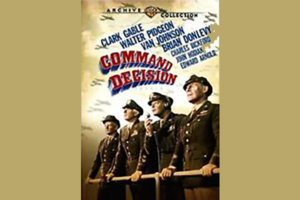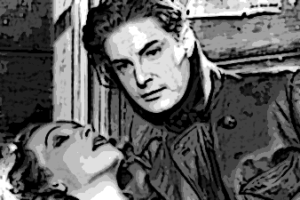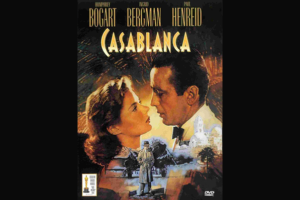
I thought I heard you saying it was a pity… pity I never had any children. But you’re wrong. I have. Thousands of them. Thousands of them… and all boys. – Goodbye, Mr. Chips (1939)


Goodbye, Mr. Chips (1939) is a wonderful tale of teaching at an English boys school
Goodbye, Mr. Chips (1939)
I will kick this month’s school films off with a movie in which the male lead won the Oscar over Clark Gable as Rhett Butler and the lead female lost the Oscar to Vivian Leigh as Scarlett O’Hara. The movie, of course, is Goodbye, Mr. Chips (1939). By the way, he also won over Laurence Olivier for Wuthering Heights, James Stewart for Mr. Smith Goes to Washington (1939), and Mickey Rooney for Babes in Arms (1939).
The man who won the Oscar for the best male actor during that magical year is English actor Robert Donat. Donat played the title role of Mr. Chips or Chipping.
Robert Donat was a mellow-sounding English actor. Donat was born in 1905 and was in his first Shakespeare production by the age of 16. He began traveling with his theater group and acted all over Britain. Alexander Korda noticed Donat’s acting chops and gave him a 3-year film contract. During this time Donat was cast as Thomas Culpepper, in The Private Life of Henry VIII (1933). Donat went to Hollywood to work on The Count of Monte Cristo (1934). Based on the strength of his performance he was offered the role of Captain Blood (1935). I can maybe see that casting. Donat didn’t like living in Hollywood and continued to avoid roles that forced him outside of Britain.
Alfred Hitchcock went to England to shoot The 39 Steps (1935) with Donat. Donat was amazing in the movie as a gentleman caught up in a spy ring. Donat went back to Hollywood to make the popular film The Citadel (1938).
Donat made the brave choice to stay in England during WWII, unlike many European actors that took the safer choice of Hollywood. During the war, he did a lot of theater and only made four films. After the war, he made another six pictures with his final film being The Inn of the Sixth Happiness (1958). By this point, an oxygen bottle was kept on stage as a result of his chronic asthma.
Donat died at the age of 53 in 1958. He left us only 20 films. Weakened by asthma the cause of death was a large tumor. The last line he spoke in a film before he died was “We shall not see each other again. I think. Farewell.”
Greer Garson played the role of Katherine. Garson was born in 1904 in London. I knew very little about this actress prior to researching for this film. She was a huge star during the war years but kind of tapered off after that. She was nominated for seven Oscars and won the best actress for Mrs. Miniver (1942).
Garson attended university with the intention of becoming a teacher but was derailed by the acting bug. She began acting in local productions and by 1932 she was doing stage work professionally. Louis B. Mayer discovered her in London and gave her an MGM contract. Her first film was Goodbye, Mr. Chips (1939). This was followed by a string of solid movies such as: When Ladies Meet (1941), Blossoms in the Dust (1941), Mrs. Miniver (1942), Madame Curie (1943), Mrs. Parkington (1944), The Valley of Decision (1945), and Adventure (1945) with Clark Gable.
In 1951, Garson became a US citizen. By the mid-50s her career power was gone. She did bits and pieces with her last file being Walt Disney’s The Happiest Millionaire (1967). She died in Dallas, Texas in 1996 at the age of 91.
Terry Kilburn was a child actor that did a little work as an adult. In Goodbye Mr. Chips he played generations of the same family John Colley / Peter Colley I / Peter Colley II / Peter Colley III. Kilburn was born in London in 1926. He is probably best remembered for two movies and the lines he delivered in each one. In A Christmas Carol (1938) he played the role of Tiny Tim and of course, delivered the line “God bless us everyone” and in today’s film he dropped the line “Goodbye Mr. Chips.”
John Mills was a grown-up version of Peter Colley II. Born in England in 1908 Mills grew up to be a beloved movie star. He had over 120 credits when he stopped acting. Determined to be an actor from an early age he went directly into performing after high school.
He began with small film roles before the war but later developed a career based on strong military roles. However, I remember him best from Swiss Family Robinson (1960). After an eight-decade career, he died at the age of 97 in 2005.
Paul Henreid played German master Staefel. Henreid was born to an aristocratic family in Vienna, Austria in 1908. After graduating he began working for Otto Preminger and studying acting at night. Through a Preminger connect Henreid was given many theater roles. As the war clouds began to gather in Europe, Henreid, travel to London in 1935. His first English role was in Goodbye, Mr. Chips (1939). After that, they began casting him as a Nazi in such films as Night Train to Munich (1940). He began working on Broadway to escape this typecasting. He began getting movie roles as the swab guy like in Now, Voyager (1942) where he lit two cigarettes and passed one to Betty Davis. And of course that year he was the anti-fascist Victor Laszlo in Casablanca (1942). After the work, he tried his hand at swashbuckling in The Spanish Main (1945). I couldn’t really see it.
In the 1950s he bravely spoke out against McCarthy and the House Un-American Activities Committee. He was blacklisted but Alfred Hitchcock hired him to direct his television show. Henried died in 1992 of pneumonia.
STORY – Goodbye, Mr. Chips (1939)
The movie begins on the first day of school in 1928. All of the boys are assembled in the great hall and the masters are present wearing their mortars and robes. It has a very Harry Potter feel to it. The headmaster says that for the first time in 83 years retired teacher Mr. Chipping will not be able to attend because he is sick.
Mr. Chipping runs across the campus heading for the great hall. On the way, he meets a boy that is running late. They are both locked out of the hall. Mr. Chipping does his best to make the boy feel comfortable. Once the door is open the boys all greet him warmly. He meets the new master and gives him some advice on the way back to his lodging. When Mr. Chipping goes inside his housekeeper berates him about how much food the boys eat each year at his teacher parties.
Mr. Chipping sits in his chair by the fire and dreams of his school years in flashback. At the age of 25, Charles Edward Chipping travels to Brookfield Public School to be a Latin teacher. The year is 1870. The train platform is filled with parents hustling later children and loud caterwauling of the boys. Again it has a very Harry Potter feel. Chipping tries to console a sad boy on the train who suddenly bursts into tears. The other boys think he may have hit the sad youth.
The other teachers warn Mr. Chipping to watch for pranks. The boys try their usually trick and began to run around the class wildly and ignore Mr. Chipping. About this time the headmaster pops in and calls Mr. Chipping to task. He also tries to fire him on his first day. That’s a little cold. But Chipping vows he will do better and becomes a strict disciplinarian.
At one point the school loses a cricket match to their rival because Mr. Chipping keeps the entire class after school. He bends the boys to his will, but they loath him. As the years pass, he becomes a master but does not have a bond with any of his students. They do a really good job in this movie of showing the years pass by changing clothing styles on the boys at first-day check-in.
At the end of one year, a housemaster job comes open and Mr. Chipping expects to get it because he is senior in tenure. However, the headmaster gives the job to another teacher intimating that Mr. Chipping does not really like students. To cheer him up, the German Master Max Staefel (Paul Henreid) invites Mr. Chipping on a walking tour of Austria. On the trip, Mr. Chipping is mountain climbing when a thick fog moves in. He hears a female voice call out from above and he bravely climbs to find Kathy Ellis (Greer Garson) safe on a ledge. She is a modern woman on a cycling trip with her friend and is about half the age of Mr. Chipping. They spend the night talking, sharing food, and trying to stay warm. They are both taken with each other. He likes that she is young and full of life and she likes that he is old fashion and kind. As soon as the fog clears a rescue party that includes Staefel and Kathy’s friend Flora. The rescue party meets the couple coming down the mountain. Mr. Chipping is the big hero but leaves the party to be alone because he is so shy. In the morning, the two women are gone by the time the men leave.
They wander around the country and Mr. Chipping is longing to see the women he has already fallen in love with. As the trip nears its end the pair takes a boat to Vienna. Unbeknownst to them, the women are also on the boat. Mr. Chipping notes that Blue Danube only appears blue to those in love. On the other part of the boat, Kathy comments how blue the water looks. They meet on the gangplank and everyone is overjoyed except an old German trying to get off the boat.
On the last night of the trip, Mr. Chipping and Kathy sit and talk while Staefel and Flora dance the night away. Finally, Kathy tells Mr. Chipping that they must dance. He shyly goes forward and they dance to the Blue Danube Waltz. Of course, this is foreshadowing their true love. In the morning they kiss at the train and Mr. Chipping is thunderstruck. As Kathy leaves on the training Mr. Chipping is afraid he will never see her again, but Staefel explains that he and Ms. Flora have already picked the wedding chapel for the wedding.
All the stodgy old masters talk about how homely Mr. Chipping’s wife must be. But as soon as they meet her they are all taken in by her charms. I will take a minute to remark on how beautiful Greer Garson looked in this film. They must have had her lite perfectly in every scene. At this point, she renames him Chips. She begins entertaining the boys with cake and tea and slowly shows Mr. Chips how to love his work. She also tells him that one day he will be headmaster of Brookfield.
Their marriage is very short because Kathy dies in childbirth early in the marriage. Mr. Chips throws himself into teaching and the years’ tick by. With the passing of time, he teaches generations of families. In 1909, a new headmaster takes over and tries to force Mr. Chips to retire. He goes to the board of governors, most of whom he has taught and they tell him he can continue until he is 100 if he wants and is free to pronounce the dead language anyway he pleases – pronouncing Cicero as SIS-er-ro, and not as KEE-kir-ro.
Around this time Mr. Chips breaks up a fight between a student and a towney or as we might call them now cutters.
In 1914, Chips finally retires at the age of 69 having never risen to the headmaster. Shortly thereafter he is asked to come back as all of the younger teachers are heading to fight in World War II. Chips is happy that his wife’s faith in him was proven correct but it is a sad time as teachers are killed and young men head off to war. At the reading of the honor roll, he sadly reports the former German Master Max Staefel was killed leading a Saxon regiment against the English. Peter Colley II (John Mills) drops by to ask Mr. Chips to check in on his wife and baby as he heads off to the war. Colley is killed shortly thereafter. He is the boy that had a fight and his driver is the boy he fought with now joining forces to fight the Germans. Of course, the Brookfield boy is the officer and the towney is an enlisted man. Peter II never makes it back from the war and it seems Chips only visited once.
One night the boys are all in the lower hall as a bombing raid from a German blimp takes place. He has a boy translate from Julius Caesar’s commentary on the Gallic Wars and as the bombs fall the passage talks of the belligerent nature of the Germans. The first zeppelin raid on London took place on September 8, 1915, and whipped out the Dolphin Tavern.
Finally, the war ended and he retired again in 1918. We have now made it back to the night he was locked out of the great hall in 1933. As a prank, older boys send a first-year student to knock on Mr. Chips’ door. When Chips sees what is happening he invites the boy in for tea, cake, and cookies. The boy turns out to be Peter Colley III.
The boy leaves with the line “goodbye Mr. Chips.” Chips hears the voices of his life and falls ill. As he lies in his deathbed he hears the professors talking about his life. He says “I thought you said it was a pity, a pity I never had children. But you’re wrong. I have! Thousands of them, thousands of them – and all boys.”
As he dies and a parade of boys from all times go by representing his life’s work. Then Peter III gives another “Goodbye Mr. Chips.”
I cry everytime I watch Goodbye, Mr. Chips (1939).
World-Famous Short Summary – Man takes way too long to get good at his job
Beware the moors










Leave a Reply
Your email is safe with us.